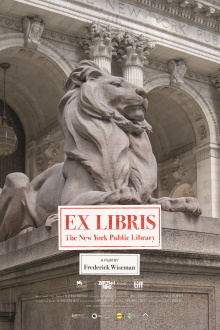Any documentary that is three and a half hours long would be formidable to approach, let alone one that is about a library. Yet this is exactly that, a documentary about the New York Public Library, which is really a whole institutional system spread out across the entire city rather than a library in a single building. I do think this might a little longer than it needs to be and I can’t say I found every part of it that interesting. But it is an illuminating look at a system of much greater scale and breadth than I’d imagined by a director, Frederick Wiseman, who work I had not previously seen, and who seems to specialize in documenting the institutions of American society for posterity.
There is no narration nor even any interviews in this documentary. Instead, it takes a fly-on-the-wall approach to record the myriad activities that take place under the auspices of the NYPL. This includes hosting talks by famous cultural icons like Richard Dawkins and Patti Smith, holding art shows and performances, providing lessons to children and even the elderly on skills like using computers to building robots, giving assistance to patrons asking after very specific, scholarly information, being a repository of archival records and artwork and much more. Naturally it also serves as a normal library where people borrow books, both physical and electronic, and where people read them. The film also captures a number of meetings of the library’s managers and administrators as they discuss policy and grapple with how best to serve the needs of their many patrons. We briefly visit many of the library’s different branches and get some idea of what the neighborhood outside each building looks like but the film does keep returning to its main branch building with the iconic stone lions outside that is also a key tourist spot.
I already knew going in that the NYPL does more than just lend books but it’s still shocking how much more it does and how many domain experts it employs. It’s kind of crazy that a person researching genealogy can just walk up the counter to ask a question and expect such a thoughtful answer. It’s also impressive how just about everyone shown can speak so well and articulate complex ideas so clearly. Granted, you’d expect anyone who chooses to be associated with the library to more inclined to intellectual matters than the average person, but the competence and level of knowledge on display is still amazing. This serves as a good reminder of how the library serves as a cultural and intellectual center of one of the world’s foremost cities and how despite jokes and stereotypes of how dumb the average American is, there are plenty of extremely intelligent people in the US.
I do also note however that so many of the meetings of the library’s administrators are ultimately about money and so many of the interlocutors who appear in the film are all about proving the value that they bring and trying to get attention for the good that they do. The NYPL is a private institution and so needs to solicit funds from donors but they also want the government to match private funds. So that means a lot of effort is put into justifying the massive resources that they need. That is honest and understandable but to put it crudely, it also feels like everyone is constantly hustling. Even the adviser at the jobs fair event hosted in the library is telling people that it’s useless how skilled or hardworking you are if no one knows about it and so it’s important to put yourself out there and put your passion and enthusiasm on public display. I don’t think this is intentional but this does highlight what I think is a particularly American characteristic.
As laudable as this approach is, it has its limits. At some point, I grew bored of watching snippets of yet more celebrities giving talks or another meeting of the administrators talking about money. I wanted instead some exposition and hard facts about just how many sites they have and some idea of the number of people they employ. It’s impressive to see them use machines to sort books but it would have been better to have some explanation of what it is they are doing and the scale of their operation. Naturally this documentary is fully supportive of the library so institution needing ever more money in order to accomplish ever more ambitious goals is always a good thing. The film also studiously avoids all controversy. It closest it comes is when they discuss how to deal with the homeless. They note that the library already has rules about not allowing sleeping in it while current NYPL president Anthony Marks remarks that they ought to be careful about segregating the homeless from other patrons but the meeting cuts off there. It would have interesting for example to learn how the library selects who gets to hold talks there and how they are navigating the culture wars that divide the US but that is out of the scope of this film.
While the NYPL is certainly a worthy subject, I feel that this film is a little too long and plays things a little too safe to be considered a truly good documentary. A film ought to be about the filmmaker having something of his or her own to say but really is more like passively documenting the institution as it currently exists for the benefit of posterity. It’s important work for the sake of history but it’s hardly something that can move me.
